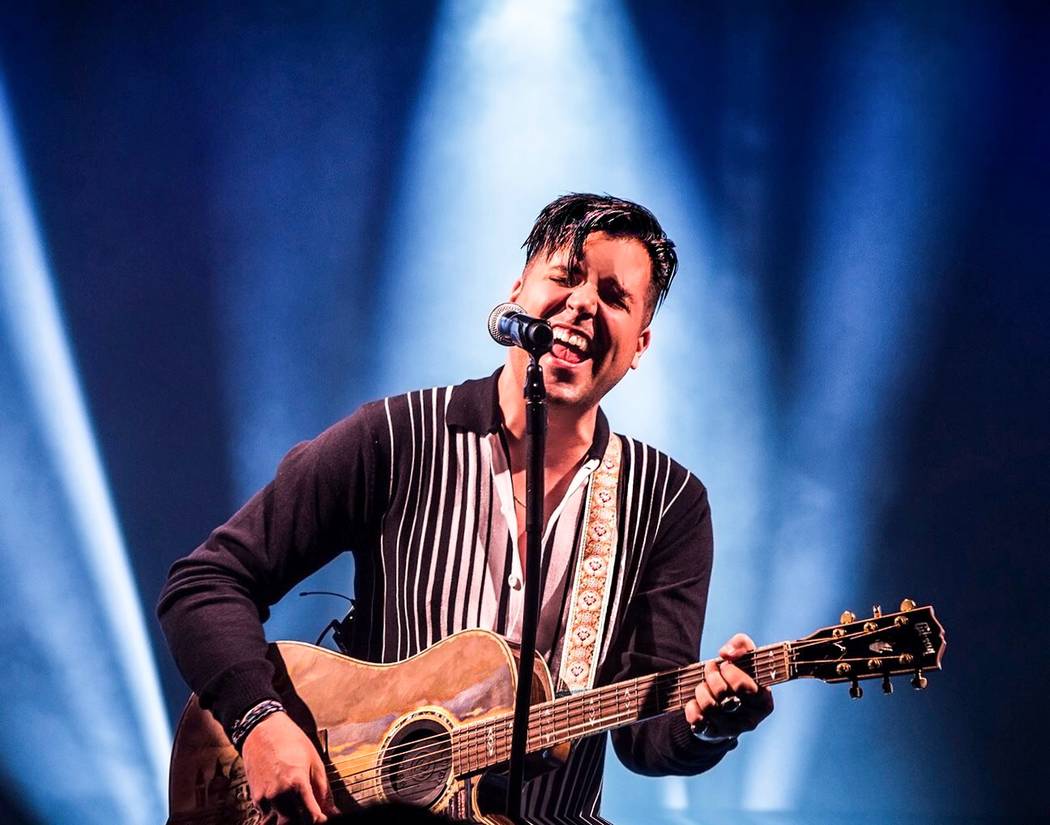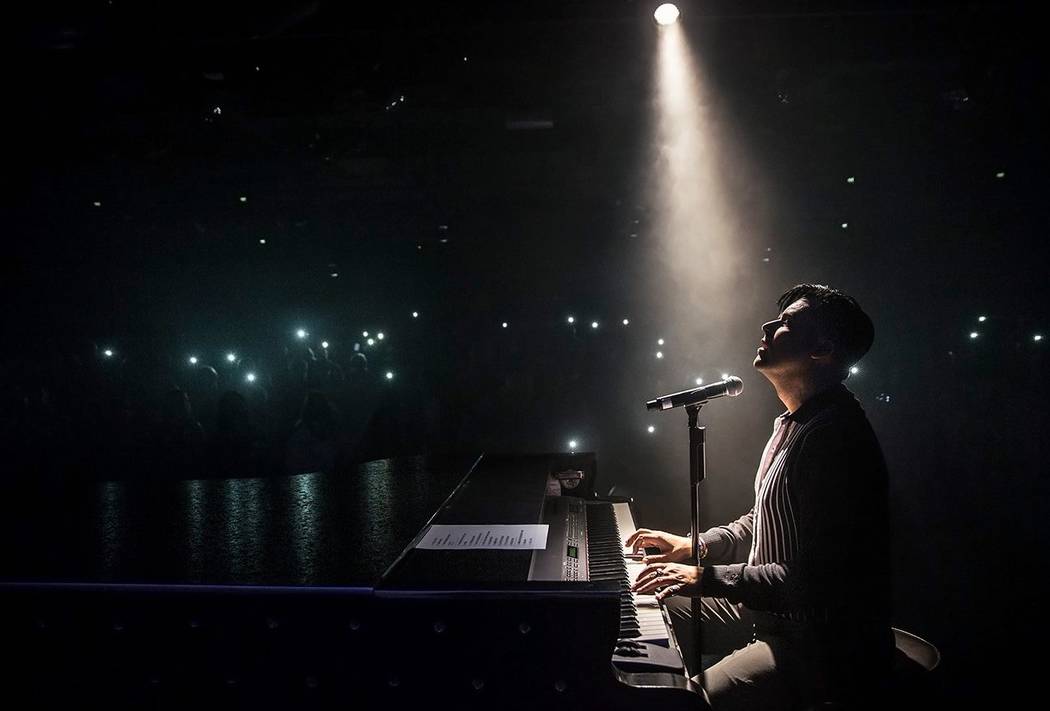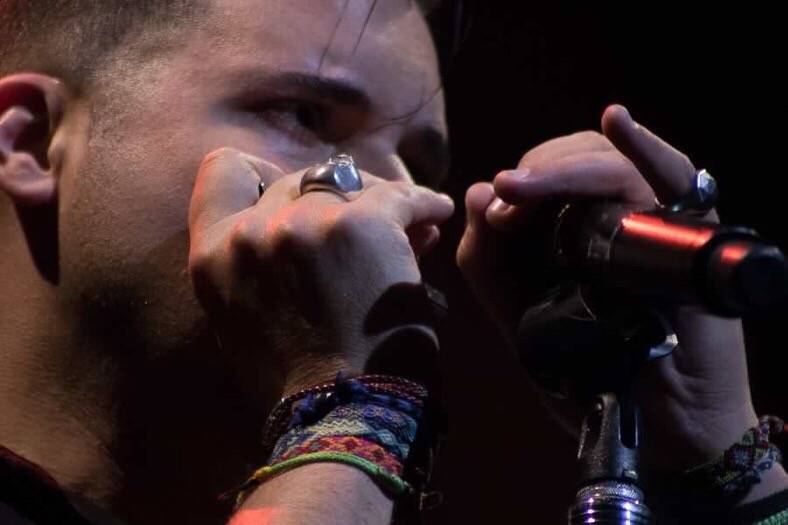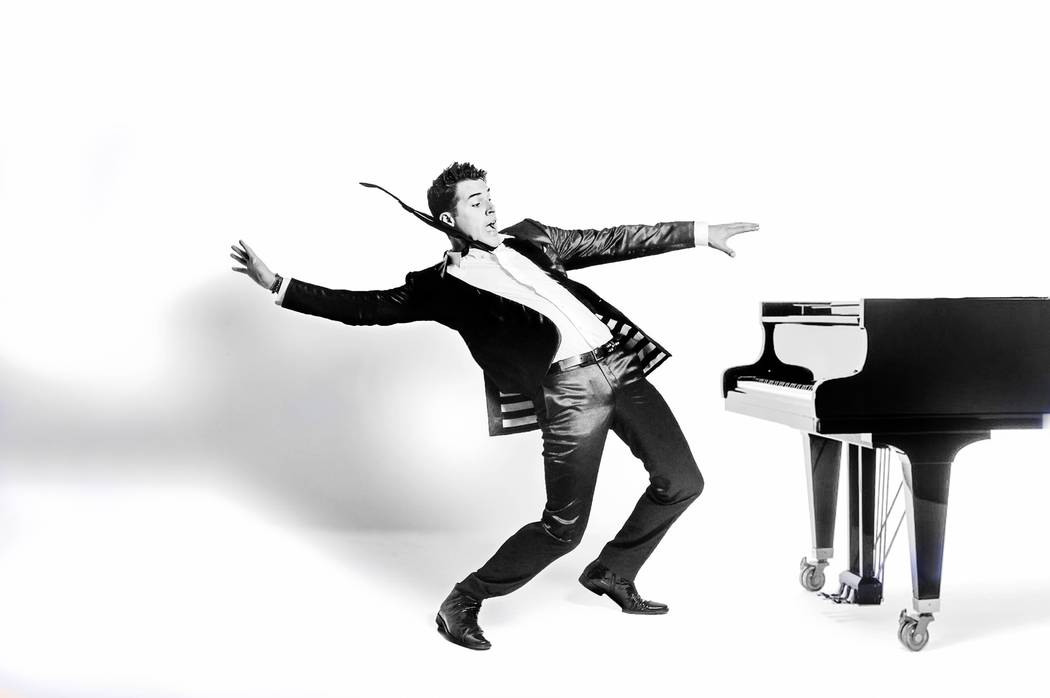Singer Frankie Moreno to play Carnegie Hall




When multitalented Frankie Moreno takes to the stage twice weekly downtown at the Golden Nugget neither he nor his band knows exactly what they’re going to play. But that’s not even the most dangerous part of his performance. Frankie is determined to turn the experience of listening and watching him into an unexpected and unscripted party — and, yet, don’t expect tunes or songs you even know.
His energy and enthusiasm are so electrifying that audiences leave their seats and start to dance at the lip of the stage. Now, he’s going to take that very Vegas vibe to the serious and sedate Carnegie Hall in New York. Frankie’s even won first-ever permission to have rolling drink carts — a la Vegas casino — roam the aisles of the prestigious and revered building since its opening in 1891. So patrons will be able to enjoy Vegas-sized drinks of scotch and soda, vodka and tonic, rum and coke or dispatch one to Frankie as he plays the hall that has hosted to such conductors as Tchaikovsky and Rachmaninoff.
You’d never guess from his pounding of the piano keys; his Presley-like gyrations at the microphone; the strumming of his guitar strings; and the on-stage razz-a-ma-tazz with the sometime upside-down-back-to-front antics with a variety of musical instruments that Frankie is a fan of the classics and their composers.
At a recent Saturday night concert, I watched with uptight, out-of-town business guests who broke their own polite codes of conduct by discarding jackets and ties and joined the showroom party. They wondered why Frankie, who was more dynamic than Elvis, wasn’t the biggest star on earth. I talked with him about that quirkiness of fame, his upcoming trip to Carnegie Hall in New York with the Vegas vibe and a lot more in the dressing room that Rat Pack kingpin Frank Sinatra once used years ago at the Golden Nugget.
Q: Why do you only play originals at the beginning of a show? That’s a dangerous high-wire balancing act?
A: Very much, I think I do that just for that reason. People come (to) my show and they don’t know who I am. I guess it really comes down to this: Our whole show is me just trying to figure out the crowd. You have so many different kinds of people in the room. We have a pretty diverse crowd from little kids to 80-year-old women celebrating their birthdays. If I go in and I start playing familiar music because they don’t know me, I instantly get them on my side in a false way.
If I play “Mustang Sally,” they love “Mustang Sally.” OK, we’re all friends but it’s not anything real that they’re going to take away. It’s just for the moment. It’s just there and they like the song and they’re just, kind of playing along — like if we were in a bar or something. If everything is unfamiliar to them, I can start reading them more as people and seeing like — what they are liking about what I’m doing, what are they not liking about what I’m doing. And win them over with a real human aspect.
Look at it like this. If I just met you for the first time in a bar and we’re having a conversation, I want to get to know you. I don’t want you to tell me a story about somebody else and maybe — the risk is — maybe I don’t like you. … So, I kind of just built off that philosophy. Just let me create a real thing when I go on stage. I want to let you know who I am. I’ll weed out the ones who aren’t going to like me, which (are) going to be some. When I’ve got them on my side — and we’re friends — we can just start sharing all kinds of music at that point. So, that’s why I started doing a couple of cover favorites toward the end.
Q: Is it easier to perform as a party rather than as a show?
A: I don’t know what you call what we’re doing. It’s a party because it’s fun like that, but I’ve just never been one (who) has been seeking stardom. I’ve never sought after being a celebrity in that sense. I’ve always just wanted to be a really good musician. Even as a child, I idolized these stars — Elvis and Frank Sinatra and Jerry Lewis and all these guys. But, my goal is, I want to be better than them as a musician, not a bigger name. That was never a goal. When I walk on stage, I don’t want it to be: Hey, look at me; look what I can do. I like just more that kind of connection of let’s just go out there and we’ll share music together; we’ll share drinks together. So, I don’t even know if it’s so much a party. Zowie Bowie does it more of a party. What Clint Holmes does is more of a musical show. I’m not really sure what we’re doing, honestly.
I tried the show thing, with the Planet Hollywood experiment and it was a wonderful show. I love that show but every night, I had to go back and do the exact same thing and it just got stale. This to me — I feel like I can really go out and — you know, we changed the song — if you came back to the next show, it would be different. It’s a similar formula but not the same
Q: Do you really go out there as you’ve said — “there’s no such thing as a set list.” How does the band know where you’re going and what to play?
A: Signals. It’s kind of like baseball. Like the catcher gives the pitch: This is our fastball No. 1, our curve ball No. 2. I give them signals. …. I have a list of songs that I would like to play but, in no particular order or anything like that. If the crowd is all standing on their feet and excited and my next song on my list to play is a ballad; it’s not going to work. So, I just skip that.
Q: That’s somewhat risky.
A: Very much so. I’m just confident enough in the fact — because it’s not a showcase of me. I’m confident enough in my ability. I think that what I’m best at is reading a crowd or unifying a crowd. I could take all different walks of people for an hour and a half and I could put them all on the same page. Just for that time. Sometimes, it takes me 10 minutes to do that. Sometimes it takes me 30 minutes to do that. But, I’m confident by the end of the night, I can get the majority of the room to be on the same page. That being said, I don’t think it really matters what the song is. For instance, if I’m playing all originals anyway, what’s the difference? You don’t know the songs, anyway. It’s more of just an energy thing than an emotional thing. Unlike most artists who come out and do two songs and then start talking to the crowd, I come out and do four. I do four songs without stopping and then I talk to the crowd. It’s four songs you’ve never heard before — unless you know me. But, I mean, originals. And I use that time to just be looking at everybody and see who’s participating, seeing who’s not. I don’t know if you remember but, as I build those four songs, it ended up being … like an audience-participation thing — everybody stand up, I’m seeing, who takes a long time to stand up, who’s instantly right up on their feet? And then I know who’s in and who’s not in, then I spend the next half of the show working on the ones who aren’t in.
Q: Now you’re making a leap from unbridled fun at the Golden Nugget to serious stuff at Carnegie Hall.
A: The Carnegie Hall concerts are going to be right at the start of the New Year. First up though, is The Kennedy Center on Sept. 15-16 of this year. I did a job with Joshua Bell several years ago. We just met and it was a fluke, he liked my stuff; I liked his stuff. We made a record and the single that we did together became No. 1. It changed my life because it was a classical song for an arrangement.
It didn’t have the impact of Taylor Swift getting a No. 1 single on the Pop Chart. This was the Classical charts. But, it really changed my pay scale — my everything. You know, we went from making $1,500 in a bar to making $15,000. Since then, I’ve done a lot of work with Joshua. We did a couple of records and he just introduced me to a whole world of classical people and that introduced me to the people who run the New York Philharmonic and the National Symphony Orchestra. As we met, we all got closer. Two years of cultivating these relationships turned into them asking me to come and play a special show celebrating Frank Sinatra. We won a couple of different symphony events: Carnegie Hall New York, Kennedy Center Washington, D.C., and Toronto.
They invited us to play the music of Frank Sinatra and, of course, I said, yes, of course. Now, I’m not that familiar with the music. I know the music. I know it all by heart but I never sang it — not my style. I learned all the songs and walking on stage at the Carnegie Hall for me was like a dream come true. We sold out Carnegie Hall, we sold out Kennedy Center, we sold out all these places and they’ve been wanting to do another show just for me. A few months back they called wanting me to do my show with the orchestra behind me; plus Kennedy Center is Sept. 15-16 and one in Baltimore the month after that. A whole lot of them follow — Carnegie Hall feels for me the ultimate achievement. For me, that’s the top of the game. It doesn’t translate so big to my Vegas world for some reason. A lot of people either don’t know about the power of Carnegie Hall or don’t care. It just doesn’t cross over. If I were to go and play the Colosseum at Caesars, oh my god, the whole town would be talking about that for sure. The last time we played there (at Carnegie Hall) we wound up on the front page of the New York Times while here it didn’t rate a blurb in a blog.
Q: So either in January or February, you’ll throw your party on the stage of Carnegie Hall with 85 musicians behind you. How do they know what you’re going to play as the party rocks on?
A: I have to do the charts for 85 musicians. I need to have the charts all done by next month and as you can imagine, that’s a pretty big task. So, I’ll probably have somebody help do a couple of them. But, I’ll try to do as many of them as I can because I want to do them.
Q: You’re a workaholic and that’s your sound.
A: I like knowing what’s going on. I like being in control of the show because I’m confident in what I can do. I’m not confident of what the trombone player in New York is going to do. I can’t take his confidence. I have to write it down exactly — here (what) it’s got to be. These shows are kind of long, they take an intermission in between the two hours. When you came I did an hour: 30. I talked a lot, and we gave out whiskey shots. Carnegie’s a different approach. I play the room for the room but I still want it to be me. I just want them to know who I am. So, we will do the drinking and we will do the fun crazy stuff.
Q: I have a feeling Andrew Carnegie would roll over in his grave if your plan is to have cocktail waitresses for the first time ever in its history roll carts down the aisles and hand out shots? It doesn’t get any more Vegas than that.
A: I want to bring Vegas to New York. It was 17 years ago, I came (to Las Vegas) for the first time. Vegas was booming and it took a couple of years to own up being from Vegas. There was a stigma. After a couple of years I realized, I do love this city. I do love how the city built me, as an entertainer. Nobody knew who I was before Vegas but I came to own the Vegas theme and I’m really proud of that. Surprisingly, it got me a lot more work. Carnegie Hall has become a big cousin for the Vegas headliner. So, I want to make sure that the Vegas influence is in everything.
I’m a classically trained pianist, So, I’m not just up there, party, party, party; let’s get drunk. I could play an hour of Liszt on the piano. But, who cares, right? It’s just a showcase then. If I stand on top of the piano and I don’t even play a note, people scream. So, I kind of got to blend the two. When I played Carnegie the last time, I walked down the aisle, holding a cocktail and singing a song. The crowd went crazy, they wrote about it in the New York Times. Nobody had walked down the aisle before to enter the stage except for Santa Claus in a Christmas Show. So, they made this big deal about it.
I don’t understand why it’s such a big deal. I like to do stuff that people aren’t doing. You know, just like our show. Why do we do all the originals right at the front? It’s a risk because the risk gives me a little bit of butterflies. You know, makes me human. So I want to do the Carnegie Hall but we’re probably going to get some backlash on that from some people but Sinatra got some backlash for being Sinatra. Elvis got backlash for being Elvis. I’m going to pass out shots like I do in our Golden Nugget show. I just want to be loose. I just want it to be like everybody, just relax. I want to just break the ice for maybe just start the show like that. But it’ll cause a little backlash.
Q: So, it’s not break the rules, it’s break the ice?
A: Yes, break the ice. Did you know the first guy that ever played Carnegie Hall was Tchaikovsky and they thought he was crazy, too. I feel confident enough in my musicianship to be in Carnegie Hall. I can play the music, so, we’re even doing portions in the show where we’re going to do a little bit longer of a classical moment. I do a little tiny bit now.
Q: I noticed hearing Rachmaninoff in your version of The Beatles’ “Eleanor Rigby.”
A: I also did a little Liszt, a little Tchaikovsky — I even hinted (at) … favorite composer, Mozart. I got attached to that as a kid and I love that stuff. I tried to incorporate a lot of those melodic lines or what Mozart did was really weird fingering like, the way he would do scales. I’m not playing Mozart per se but, I’m utilizing his scaling system in my solos. So, even though, you hear like a Jerry Lee Lewis kind of piano solo, it usually ends off with something to do with Mozart or Beethoven in there because most people would never, ever, ever know that. But, I know it and for me it gives me a little bit more of a challenge, just banging on a piano. All I listen to at home is classical music from morning to night. I love classical music but I do this pop material because there’s only a handful of people that can be successful classical musicians.
Q: It’s not exactly commercial.
A: It’s not commercial but, it’s wonderful. You actually watch some of these guys like Joshua Bell — there’s kind of nothing like it. Even if you don’t like classical music, Joshua Bell, will be at my house. He’ll just pull out the violin and start playing. When you sit in front of that and listen to it; it’s a different emotional experience. Music is such an emotional connection. But, we’ve lost a lot of that in translation over the years because of television and radio and commercially putting name tags on styles of music. This one is country, rock and this one’s blues. With classical its hundreds of years of bodies of work of different stuff and all gets identified as “classical.” When I watch these guys play, it inspires me and makes me wonder when I see so many of the artists of today — and no way do I ever bash any of the artists — but they are more focused on being celebrities than just being good. That’s why classical music excites me. Other acts can play the music we’re playing and do what we’re doing but I take pride in those little moments when I do throw in something that they can’t do. That’s what excites me in my show and makes it not boring for me. It’s those little classical influences.
Q: Now, I’m hearing rumors that you’re going to be composing music for one of the biggest global stars of all time who has a residency here on the Strip: Celine Dion?
A: This one song, in particular, I wrote just for her. I tailored it for her — this is for nobody else. It deals with the experience she just went through and how she’s going to be strong about it. It’s like she wrote it herself. Since you’ve heard the rumors you can say that Celine may be doing one of Frankie’s songs.
Q: It sounds as if you could have another No. 1 hit.
A: The single with Joshua was No. 1 on two charts: Classical Billboard Charts and the Classic Crossover Billboard Charts.
It was up there for a long time. We recorded the entire Air Supply album that I wrote for the band the following summer
As my No. 1 started to drop down. Air Supply’s top 10 started off but nobody knows who the songwriters are. They don’t announce that on the radio. As that wore off, I did a Christmas record with Joshua. The version of “I’ll be Home for Christmas” hit No. 7 on the Holiday Charts for Billboard. So, I’ve been on the Billboard Charts top 10 now for a couple years in a row and you just never would know.
I don’t think those things translate. They just want tigers and feathers out here. I don’t know. I totally get that the classical thing doesn’t play into our world here in Vegas but you would think that those would be at least acknowledged. Vegas is totally different than any other place in this country. It’s a very small-knit town and it’s very isolated from everything else at least in the music world.
I kind of have to do that crazy show I’m doing out here. … I don’t have to work so hard if I go to Montana or even New York. I don’t have to work so hard. Like, I get to go onstage and (not have to) fight for an hour for attention. It’s just different, it’s not bad, I love it. It’s just different like — because there’s so much to compete against. Naked girls, and magic and fireworks and whatever else on the stage. We’re so saturated. There’s nothing wrong with that. It’s just how do you get people to look at you when you have all those things around you. Here’s free money; here’s alcohol; here’s everything. Hey, look at me sing a song you’ve never heard before. Well, it’s just a little bit of a push and pull but I think we’re figuring it out by trying to just make it more. I think what we’re doing on our stage is just unique in the fact that it is completely tailored to the audience that night. I don’t know if there’s another show that you could say that about.
My favorite shows: The “Jersey Boys” — loved it but it’s the same night after night. I’ve seen Absinthe five times they’re always somewhat the same. You can’t change, and you don’t want it to change. I love these shows but they’re somewhat tailored the same concept, the same thing. But, our show, this week, I’m doing a whole bunch of old standards in the show because we want to. It’s nice for me to keep my sanity because that was one thing that was killing me at Planet Hollywood was going up to an exact same set, every night, the same words between songs, that’s for a different artist, that’s not for me.
“Our song set changes pretty regularly so we don’t really work off a set list. I just play what I think would work at the moment. I open with the original “Angel Town,” five other originals and then our hit “Tangerine Honey” and “Missing You.” It’s risky to do all originals in the first part of the show but luckily it’s been working.
The covers we do to finish include “Can’t Help Believing’ “ by BJ Thomas; “Eleanor Rigby” by the Beatles and their “I’ll Cry Instead” closing with “Wild One” by Jerry Lee Lewis.”
Frankie Moreno entertains at the Golden Nugget every Thursday and Saturday in the showroom at 8 p.m. Call it a mix of Rat Pack glamour and vintage Vegas swagger but call it a smashing hit. His band includes brother Tony Moreno on bass, Mike Zerbe pin drums, Alec Zeilon on guitar, Fabricio Bezerra on sax, Pete Bresciana on trumpet, Jim D’Arrigo on baritone sax, and singers Crystal Robinson, AshleyKellough and Markevius Faulkner. Rob Lyons, formerly of Million Dollar Quartet who played guitar played his farewell show prior to his return to hometown England.












